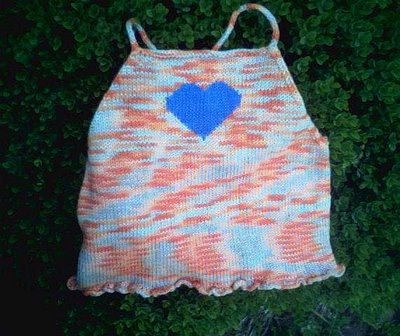
100% cotton yarn; I have found that intarsia (the technique used to make the blue heart) works much better than stranded Fair Isle style knitting for incorporating color with cotton yarn. Intarsia gives you a much smoother result - of course it limits what you can do, but it also saves yarn! I had maybe one yard of the orange left over at the end, so intarsia works well for extending the yarn you have to work with (Dot, the darker blue diamond in the scarf I knit for you is intarsia as well).
Main topic:
I was thinking about sadness the other day, and wondering in terms of brain chemistry why do humans experience this feeling? How is sadness or grief a survival trait? Terry thinks it is a function of our capacity to hypothesize, or to imagine different realities; he read some article about how the ability to anticipate things that have not yet happened is a survival trait related to pattern recognition. If the hunter can anticipate the movements of the beast, it is more likely to come home with a kill than not. The hunter's experiences over time build up to a recognition of certain patterns in underbrush and spoor; thus he can successfully imagine a reality that he is not directly experiencing.
Trouble is, I can imagine realities in which Aaron (Solana's dad) is alive, in which I have a child of my own - and now, not years from now! and this capacity to imagine corresponds to a capacity for sadness that can be hard to bear sometimes. Which brings me back to the original question - what is the point of sadness? What is the purpose? Why do humans experience grief? Ultimately, of course, what I am demanding is an accounting for why I must experience grief and sadness - I'm just good at intellectualizing these things. Maybe that's a survival trait in itself.
1 comment:
Intellectualization may be a coping response actually - at least it is for me... as you will see.
In reading you post I find myself saddened for you, and yet I am, in a small way, happy that I can at some level empathize. Empathizing represents connection, and connection at some level means a community of both grief, and hopefully joy. I don't believe grief to be unique to the human experience. There is evidence that elephants grieve, for years actually, and anecdoteally (another prime example of why I don't do the spelling things in cranium) I can say that the dog displays a form of grief every time Tara leaves. Perhaps I am anthropomorphizing too much.
Regardless, I think grief may be a function of self preservation. You grieve at loss, sometimes even feeling a part of you has died, and yet you live, breathe, and eventually carry on - changed, no doubt by the process. So if we are able to empathize with others pain, or are able to recognize loss, we develop strong habits and proclivities based around avoiding those feelings in ourselves, and in others. We become careful to avoid pain - sometimes too careful, to be sure - but a part of this care preserves that portion of ourselves for others close to us to nurish. And like elephants and dogs, we are pack animals - our family's and clans become a part of us, and our living experience. Maybe this means that grief may not be so much an emotion, but rather the absence of one, in other words perhaps it may be more a recognition of the memory of joy and it's loss.
I am just speculating, of course, and don't understand evolutionary grief either. Often I find I just wish for it's end.
Post a Comment